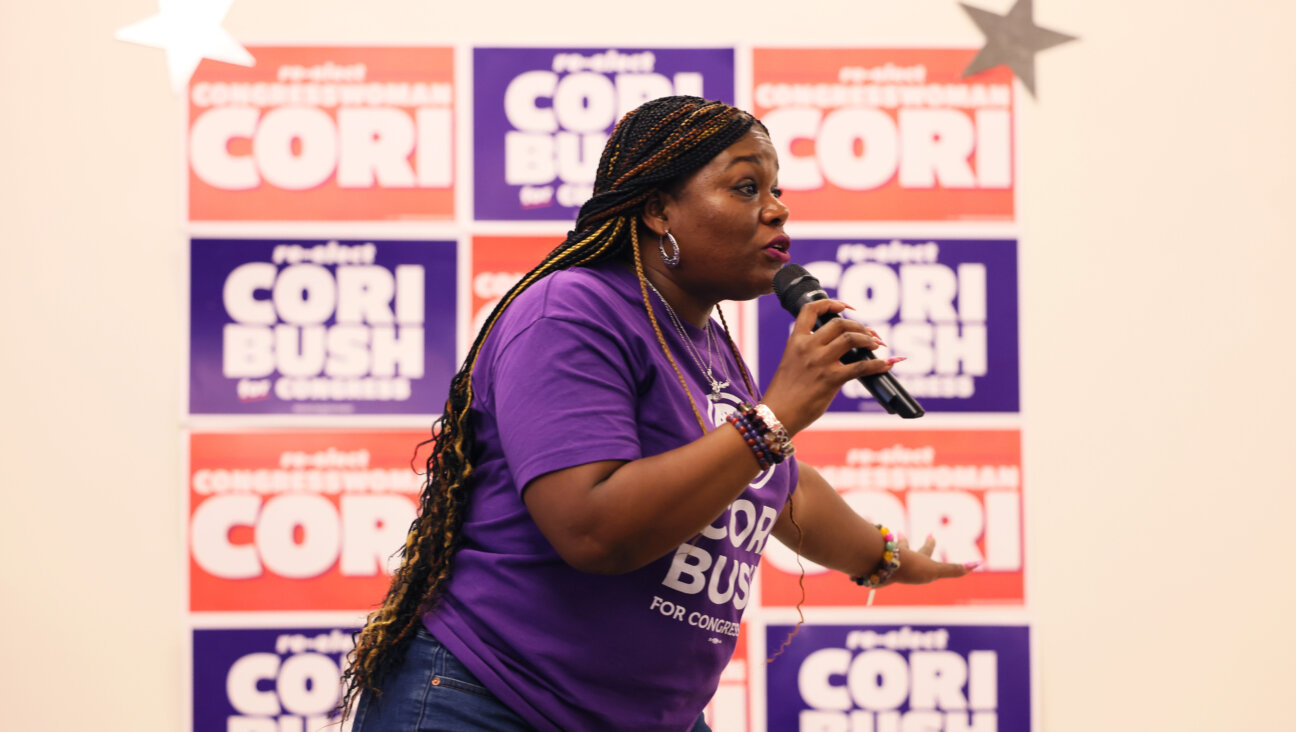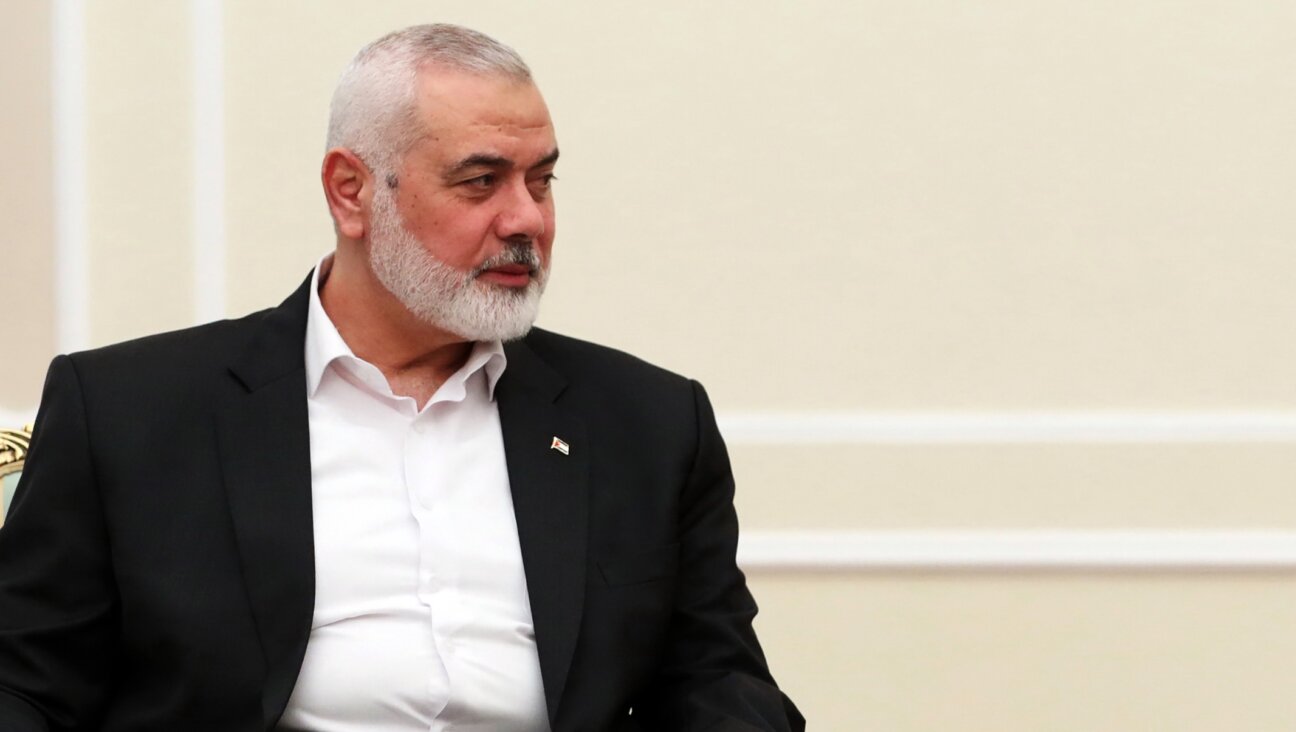Conservative Rabbis Set To Debate Opening the Door to Intermarrieds

Graphic by Angelie Zaslavsky
A top Conservative movement official thinks that Conservative rabbis should be allowed to participate in interfaith weddings.
Now explicitly barred by the movement, the proposal — put forward by Rabbi Charles Simon of the Federation of Jewish Men’s Clubs — is one of a handful of new efforts by Conservative rabbis to loosen restrictions on participation by non-Jews in synagogue life.
Conservative Judaism’s top rabbinical body on matters of Jewish law voted in October to allow non-Jews to open the ark containing the Torah during a prayer service. Meanwhile, the movement’s day school arm is considering changing its policies to allow children with a Jewish father but no Jewish mother to attend its schools. And at the movement’s rabbinical conference last year, participants discussed lifting a ban on rabbis attending intermarriages.
“If a synagogue wants to continue to attract and provide meaningful services to a changing population, all of these points are things they have to think about,” said Simon, whose recommendations will be presented at a December 2 meeting of Conservative rabbis to discuss the intermarriage issue.
The new wave of efforts by Conservative rabbis to accommodate the intermarried comes months after the Pew Research Center’s study of American Jews found identification with the Conservative movement to be dropping fast. While 24% of Jews aged 65 and up identify as Conservative, just 11% of Jews aged 18-29 do the same.
The Reform movement, meanwhile, has higher affiliation rates across age groups. Some analysts have suggested that the high rates of intermarriage among non-Orthodox Jews are driving Conservative Jews to Reform congregations, which offer fewer religious barriers to participation by intermarried families.
Though Conservative doctrine is opposed to intermarriage, intermarriage is rampant in the Conservative pews. Conservative rabbinic leaders hope that if they draw in intermarried families, their children will receive Jewish upbringings.
“It’s not that people aren’t in favor of conversion [of the non-Jewish spouse], but they recognize that conversion is not the ultimate goal — that raising a Jewish family is the ultimate goal,” Simon said. “And conversion is more complicated than it was thought to be 20 years ago.”
The proposal to allow rabbis to participate in intermarriages is one of 14 recommendations that Simon has co-written with Rabbi Kerry Olitzky, a Reform rabbi who heads the Jewish Outreach Institute, to advance acceptance of intermarried families in Jewish congregational life. The proposals by Simon and Olitzky run from the seemingly anodyne, like urging teachers to be respectful of children with intermarried parents, to the potentially controversial, like allowing children with Jewish fathers and non-Jewish mothers to have bar and bat mitzvahs without undergoing a formal conversion ceremony.
Other proposals include allowing “aufrufs,” or premarital blessings, for intermarried couples, and allowing clergy to officiate at funerals of non-Jewish community members. Both of these are already standard practice at some Conservative synagogues. The document also suggests allowing non-Jews to join the synagogue as full members and to sit on synagogue boards.
“I’m not trying to push rabbis or synagogues or the movement into a place they don’t want to go,” said Olitzky, who attends a Conservative synagogue and has two sons who are Conservative rabbis. “Instead I’m saying to them, if you are going to welcome intermarried families into your institutions, and into your movement, this is what you have to [do to] deliver on the promises you’re going to make.”
Rules about what non-Jews can do within the synagogue vary among Conservative congregations. Few, if any, allow a non-Jew to be called to the Torah; most would allow a non-Jew to read English blessings, like a prayer for peace. The lines in between these extremes are unclear.
Among Olitzky and Simon’s proposals, the one that would allow rabbis to participate in an intermarriage could prove to be the most controversial. Simon himself told the Forward that he has never attended an intermarriage. Conservative rabbis are currently barred by the Rabbinical Assembly from officiating at, participating in, or even attending intermarriages, on pain of expulsion from the rabbinate.
Conservative leaders seem unlikely to lift the officiating ban anytime soon. “I think that’s going further than most of my colleagues are willing to go at the moment,” said Rabbi Elliot Dorff, a professor at the American Jewish University and a member of the Committee on Jewish Law and Standards, which rules on matters of religious law for the movement.
“My guess is they’re going to get a lot of pushback,” Dorff said of Olitzky and Simon.
Rabbinical Assembly head Rabbi Julie Schonfeld told the Forward in an email that Conservative rabbis “do not and would not” participate in intermarriages, but she made clear that the ban on attending intermarriages is up for debate.
“Rabbis are torn between our desire to be present for people we love and care about on such an important day and a question as to whether this is the right place for us to be or the right way for us to demonstrate that caring,” Schonfeld said. “At the present time, there is not a decision to lift the ban, but it will undoubtedly continue to be discussed.”
While the CJLS may not be ready for Simon and Olitzky’s proposals on weddings, the group appears to be moving incrementally in their direction.
In a October 15 vote, the group approved a new ruling that allows non-Jews to open the ark during synagogue services. CJLS rules require just six of the group’s 25 voting members to vote in favor of a ruling for it to be adopted, so the ruling on opening the ark passed despite no votes from 12 rabbis and yes votes from just eight.
The ruling, written by Rabbi David Booth, argues that there is no discussion in medieval rabbinical literature of the question of whether non-Jews can open the ark, and thus no ban. Booth argues that the symbolism of opening the ark allows for a non-Jew to take the role, and that it can serve to honor non-Jewish family members and invite non-Jews to become Jewish. Booth concludes that local rabbis should have the option of allowing non-Jews to open the ark during a service.
Many on the committee disagreed with the position. “There’s a distinction between recognizing someone who is not Jewish who is having a spiritual expression on behalf of themselves… as opposed to having them do something that makes them a representative of the community in ritual,” said Rabbi Joshua Heller, who voted against the opinion. “For me, having someone open the ark, they are acting on behalf of the community… For me, that is a dividing line.”
According to Heller, the CJLS vote took place after the release of the Pew report, though the process of considering the question started long before. Heller said that the issues raised by Pew were part of the conversation.
“There’s a movement-wide recognition that this is an issue we have to grapple with,” Heller said.
Contact Josh Nathan-Kazis at [email protected] or on Twitter @joshnathankazis
























